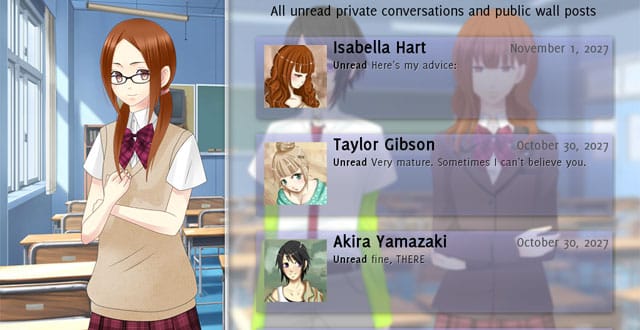Review: Don’t Take It Personally, Babe, It Just Ain’t Your Story

I keep telling myself that the title is true. This was a story I was thrust into. I had no control over the events that took place. I wasn’t going to find myself in these kinds of difficult situations in my real life; and if I did, I would handle them with more care.
And really, Don’t Take It Personally, Babe, It Just Ain’t Your Story isn’t interested in making this my story—at least, not like narrative games such as Dragon Age, Mass Effect, or even BioShock, games based partly on the player’s ability to affect the narrative in meaningful and numerous ways. I spend most of this game observing the narrative, with few opportunities to truly alter it. From the first few minutes, that lack of control lends itself to a deeper feeling of dread. I get the unavoidable sense that this is a story destined for disaster.
This intuition comes not from the story proper, but from the countless Facebook-style messages between students that I can read. These messages appear as the story unfolds, and often at inopportune times, when I am trying to remain engrossed in the tale of the first-year teacher and protagonist, John Rook. Before clicking to the next frame of dialogue, I grapple with whether I check the messages now, or later. I hesitate; but every time, I click the numbered icon in the corner, and scour the social network for clues.
In the moment, I might inappropriately lead this girl on, or I might reject her and crush her spirit and self-esteem.
I am eavesdropping on my students—I am a teacher-spy, with the school administration’s blessing to use these questionable resources to combat bullying. As the story progresses, the messages shed light on events. They provide details about the lives of my students that I probably shouldn’t know in the first place. A web of drama and crises unfolds in Don’t Take It Personally, and I am forced to indulge myself along with Rook, who also seems relatively powerless to alter his own story.
Don’t Take It Personally is the latest from Christine Love, an independent developer and writer of visual novels. In her previous work, Digital: A Love Story, she explored the role technology has in shaping our personal and social lives—a theme she continues to explore here, this time bouncing between the real world and social networks. Using the template of the visual novel, Love uses the format’s accessibility and linearity to emphasize the inevitability of the events.
After all, progression is simple. The player simply reads, clicks, and checks any new messages. Scenarios arise and evolve with very little input from us. It’s a situation that feels strangely true to life. During those key moments when we are given the power of choice, we seem to be facing unavoidable circumstances that have coalesced into binary choices. Rook spells out the implications of these choices, but the game refuses to provide easy answers.
The most obvious of black-and-white moral decisions—whether or not I should develop an intimate relationship with an underage girl—is fraught with possible blowback either way. In the moment, I might inappropriately lead this girl on, or I might reject her and crush her spirit and self-esteem. Ironically, it was the unstoppable force of the story that made me feel as if I was truly playing a role. As in my own life, I found myself staring, slack-jawed, at the drama that surrounded me, desperately wanting to stop it but finding myself without the tools to do so.
I tried to detach myself from Rook’s insistence on rummaging through his students’ digital correspondence. I insisted that I wouldn’t have looked at their private messages, that I wouldn’t have let a relationship with a high-school student go far enough to require that difficult and brutal decision, and that I would have done a better job of being there for my students than Rook does. But the truth is, a deep knowledge of each student’s intentions and emotions is absolutely necessary for the type of relationship wrangling that takes up most of this narrative. Being there requires a reliance on social networks, and an open-door policy with the students. Without those two aspects, the narrative is reduced to a drama about the students’ less-than-stellar grades. With them, I’m taking part in a story that means more. I’m making a difference.
This opens Rook up to a host of dangers. I am “playing” in a very real sense—using this opportunity to test the limits of openness. Don’t Take It Personally feels like the story of a life less guarded. Whether we’re interacting with students, peers, or authorities, that tension between openness and caution will always exist. As a writer who lives a significant portion of my life on social networks, it’s a tension I’m extremely familiar with. I’m not a teacher. I’m not trying to get a classroom of students to feel comfortable with me, and also make good grades. But I took this game personally.



